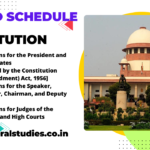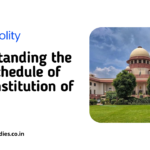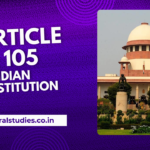Table of Contents
Introduction: Directive Principles of State Policy
The Directive Principles of State Policy (DPSP) are a set of guidelines or principles laid out in Part IV of the Indian Constitution (Articles 36-51). These principles are crucial in the governance of the country and provide a framework for the creation of laws. Though not enforceable by courts, they are fundamental in shaping the laws and policies in India. Here’s an overview of the DPSP:
Overview of the Directive Principles
- Definition (Article 36)
- “The State” in this context is defined as in Part III of the Constitution, encompassing the
- Government and Parliament of India, and
- the Government and Legislature of each of the States and
- all local or other authorities within the territory of India or under the control of the Government of India.
- “The State” in this context is defined as in Part III of the Constitution, encompassing the
- Application of Principles (Article 37)
- The principles laid out in this part are not justiciable, meaning they cannot be enforced by any court. However, they are fundamental to the governance of the country and serve as a guiding force in making laws.
- Social Welfare and Justice (Article 38)
- The State is tasked with striving to promote the welfare of the people by creating a social order based on justice—social, economic, and political.
- Specifically, the State should work to minimize income inequalities and eliminate disparities in status, facilities, and opportunities among different groups and regions.
- Key Policy Principles (Article 39)
- Ensure all citizens have the right to an adequate means of livelihood.
- Distribute community resources in a way that benefits the common good.
- Prevent the concentration of wealth and means of production in a manner detrimental to society.
- Guarantee equal pay for equal work for both men and women.
- Protect the health and strength of workers and prevent child labor and exploitation.
- Provide children with opportunities to develop in a healthy, dignified environment and protect them against exploitation.
- Equal Justice and Free Legal Aid (Article 39A)
- Promote justice on the basis of equal opportunity and provide free legal aid to ensure that no citizen is denied justice due to economic or other disabilities.
- Village Panchayats (Article 40)
- Encourage the organization of village panchayats and endow them with powers necessary for self-government.
- Right to Work and Education (Article 41)
- Make provisions for securing the right to work, education, and public assistance in cases such as unemployment, old age, sickness, and disability, within the limits of the State’s economic capacity.
- Humane Working Conditions and Maternity Relief (Article 42)
- Ensure just and humane working conditions and provide for maternity relief.
- Living Wage and Decent Work Conditions (Article 43)
- Secure for workers a living wage, decent work conditions, and opportunities for leisure and social and cultural activities. Promote cottage industries in rural areas.
- Worker Participation in Management (Article 43A)
- Encourage the participation of workers in the management of industries through appropriate legislation or other means.
- Promotion of Cooperative Societies (Article 43B)
- Promote the voluntary formation, autonomous functioning, democratic control, and professional management of cooperative societies.
- Uniform Civil Code (Article 44)
- Strive to implement a uniform civil code applicable to all citizens across India.
- Early Childhood Care and Education (Article 45)
- Endeavor to provide early childhood care and education for children until they reach the age of six.
- Educational and Economic Interests of Weaker Sections (Article 46)
- Promote the educational and economic interests of weaker sections, particularly Scheduled Castes and Scheduled Tribes, and protect them from social injustice and exploitation.
- Nutrition and Public Health (Article 47)
- Aim to raise the level of nutrition, improve the standard of living, and enhance public health. Endeavor to prohibit the consumption of intoxicating drinks and drugs except for medicinal purposes.
- Agriculture and Animal Husbandry (Article 48)
- Organize agriculture and animal husbandry on modern and scientific lines and take steps to improve breeds and prohibit the slaughter of cows and calves.
- Environmental Protection (Article 48A)
- Work towards protecting and improving the environment and safeguarding the forests and wildlife.
- Protection of Monuments (Article 49)
- Protect monuments, places, and objects of national importance from spoliation, disfigurement, destruction, and removal.
- Separation of Judiciary from Executive (Article 50)
- Ensure the separation of the judiciary from the executive in public services.
- Promotion of International Peace (Article 51)
- Promote international peace and security, maintain just and honorable relations between nations, foster respect for international law, and encourage the settlement of international disputes by arbitration.
Related Article:
Importance and Impact
- Guidance for Lawmaking: Although not enforceable by courts, the DPSPs guide the State in making laws and policies aimed at creating a just and equitable society.
- Social and Economic Reforms: They focus on social and economic welfare, providing a foundation for reforms that aim to reduce inequalities and improve living conditions.
- Balancing Rights and Duties: While Part III of the Constitution enumerates fundamental rights, Part IV complements this by outlining the duties of the State towards its citizens.
- Dynamic Application: Over time, the DPSPs have influenced various socio-economic legislations and continue to serve as a yardstick for evaluating the performance of the State in terms of welfare and justice.
Latest on Polity
- Second Schedule of the Constitution of IndiaThe Second Schedule of the Constitution of India outlines the provisions related to the salaries, allowances, and privileges of the President, Governors, Judges of the Supreme Court and High Courts, the Comptroller, and the Auditor-General of India.
- Fifth Schedule of the Constitution [244(1)]The Fifth Schedule provides detailed guidelines for administering Scheduled Areas and protecting Scheduled Tribes in states other than Assam, Meghalaya, Tripura, and Mizoram.
- Understanding Services Under the Union and the States – Part XIV [14] in the Indian ConstitutionKey Points:
- Understanding the First Schedule of the Constitution of India1st Schedule of the Constitution of India Part I States Related Article: Part II Union Territories Constitution of India UPSC MCQ will be uploaded soon.
- Part 5 Chapter 1 – The Executive: President and Vice-President | Constitution of IndiaPresident of India Article 52: The President of India Establishment of the President: This article establishes the position of the President of India as the head of state. Article 53:…
- Article 105 of Indian Constitution – Power and Privileges of Member of ParliamentArticle 105: Powers, Privileges, and Immunities of Parliament and Its Members Article 106 of Indian Constitution: Salaries and Allowances of Members of Parliament Read More: Officers of the Parliament of…
- Part 15 of the Indian Constitution: Ensuring Free and Fair ElectionsArticle 324: Superintendence, Direction, and Control of Elections Article 324 of the Indian Constitution establishes the framework for the Election Commission of India and outlines its powers, functions, and structure…
- Officers of the Parliament of India [Part 5, Chapter II] | UPSC Notes for Indian PolityArticles at a Glance (Officers of the Parliament) Article 89: The Chairman and Deputy Chairman of the Council of States. Article 90: Vacation and resignation of, and removal from, the…


![Fifth Schedule of the Constitution [244(1)] 2 Fifth Schedule of the Indian Constitution](https://generalstudies.co.in/wp-content/uploads/2024/05/Fifth-Schedule-of-COI-150x150.png)
![Understanding Services Under the Union and the States - Part XIV [14] in the Indian Constitution 3 General Studies](https://generalstudies.co.in/wp-content/uploads/2023/03/ygjyg-150x150.png)


